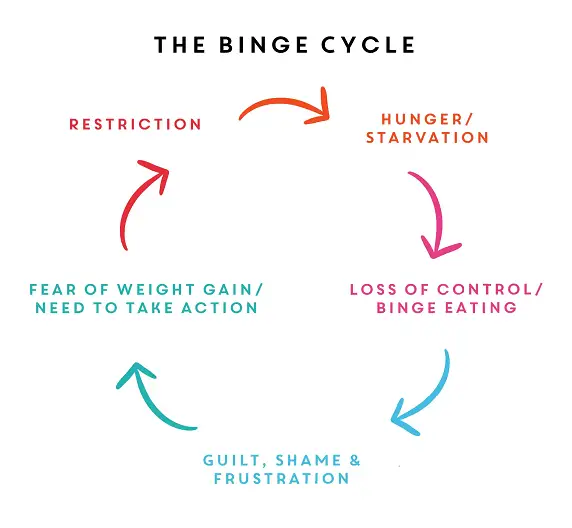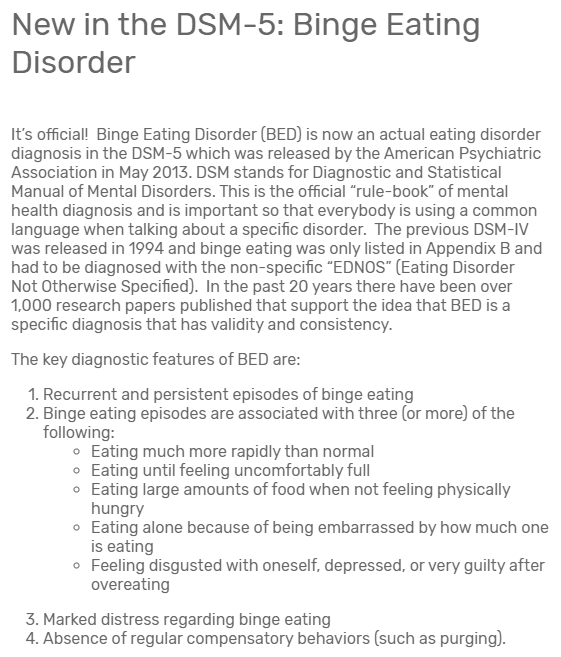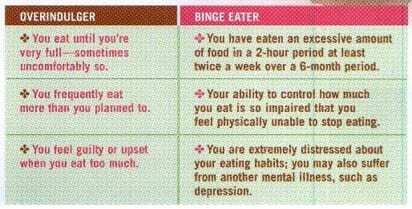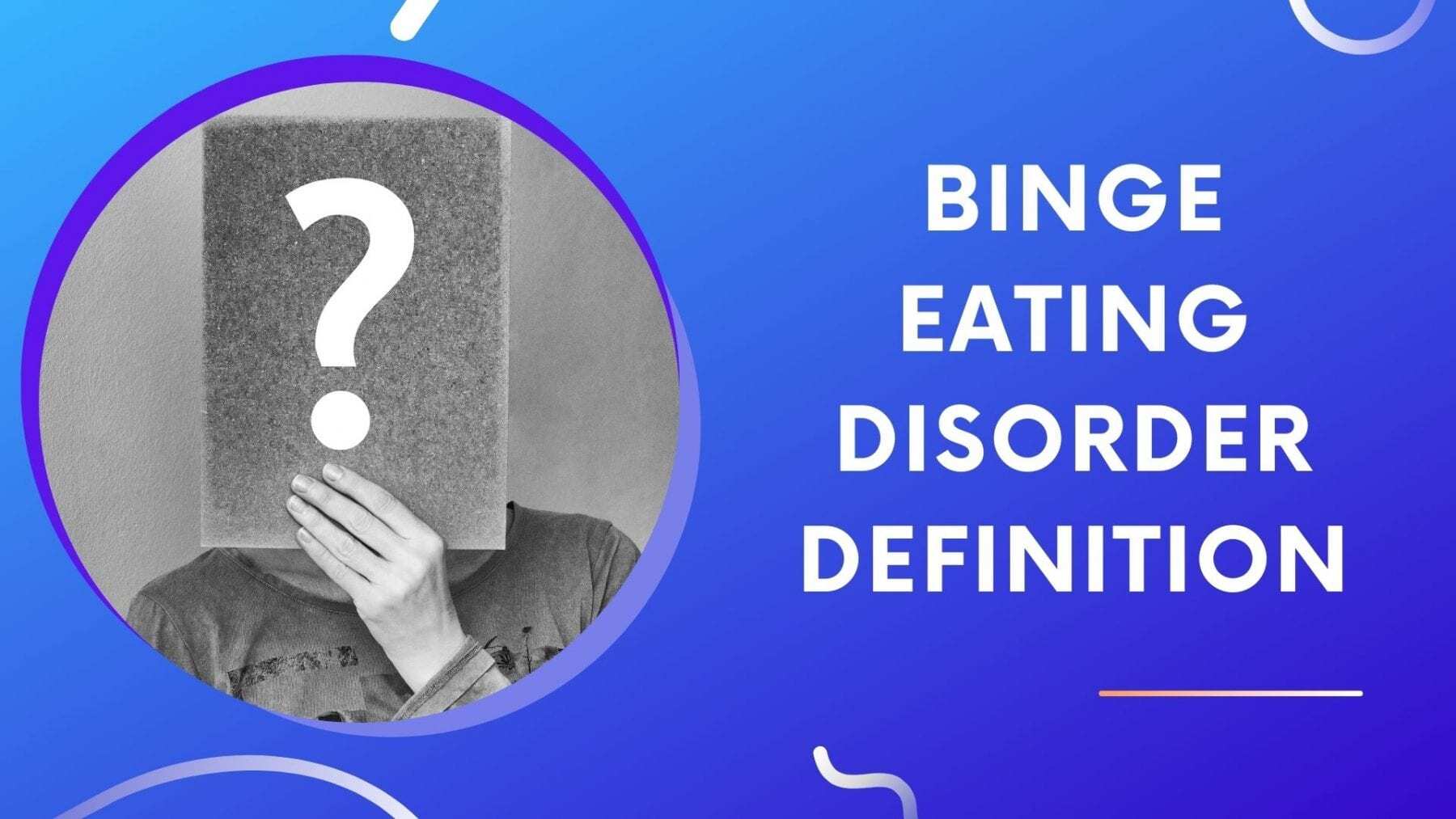Let’s say one day you eat 4 cookies after your breakfast, lunch, snack and dinners, for a total of 16 extra cookies.
Does this mean you have Binge Eating Disorder? Or do you merely have a bad habit of overeating?
Heck, what does it even mean to binge eat? What is a binge? How long does binge eating last?
And what even causes binge eating in the first place?!
In this blog post I will answer all the above questions. I used to overeat myself, and now I help people who struggle with both overeating and binge eating.
My basic premise is simple: the technical definition of ‘binge eating’ doesn’t matter.
There are solutions out there, but you probably won’t be willing to actually dig deep and get the help you actually need unless you really appreciate – recognize, feel, and understand — the true depth of the problem in front of you.
Let’s dive in:
What Does It Mean To Binge Eat?

I just had this conversation the other day. A client said they never binged like what they heard other people at Overeater’s Anonymous say.
This client said that at Overeaters Anonymous one person would talk about eating something like two dozen donuts at a time, but that they (my current client) would only overeat a few extra cookies.
I asked my client if they felt guilty at all, if their stomach was ever painful from overeating, or if they ever felt like they just somehow lost their control around food.
Sure enough, they did feel guilty and like they couldn’t stop themselves sometimes. Although only on extremely rare occasions did their stomach become painful.
These are the three hallmark signs of Binge Eating Disorder (BED):
- Eating too much (either by incredible binges with tons of calories or even just eating too much in general).
- AND, a sense of guilt, perhaps not all the time but very often a definitive remorse over the amount you are eating.
- AND, again perhaps not all the time, but often you experience a loss of control around food. Most frequently this looks like an inability to stop eating; you just keep on eating.
You can think of the above three signs as the major characteristics of Binge Eating Disorder.
However, I also want to provide you with the medical synopsis of Binge Eating Disorder.
While I do not take insurance, if you are seeking treatment (whether inpatient, outpatient, etc.) then this definition is how the insurance company alongside your medical treatment provider will determine your coverage.
Below you can see an image from The National Eating Disorders Association website listing the technical, medical DSM-5 Binge Eating Disorder definition.

What Is A Binge?
Technical definitions aside, how much food is a binge? Does only a large amount of food consumed count as a binge? Do you need to consume a large amount of food over a short period of time?
For example, do you have to eat over 2000 calories in one sitting for it to count? And if the line is somewhat more grey, then when does eating too much cross the line and become a binge?
To start this conversation off, let’s take a look at the following table about eating. Notice the different ‘feel’ of the two columns.
OverIndulger Versus Binge Eater

The OverIndulger column is somewhat benign, a problem for sure but not terrifying. On the other column, Binge Eating Disorder sounds terrifying.
In general that’s the difference between overeating and binge eating disorder. It’s not about whether you consume large amounts of food or not. It’s more about how disturbed you are over your eating.
If you’re chill with eating large amounts of food then you’re what I would term an ‘overeater’. But please realize that someone could overeat the exact same amount of food as you, but perceive things way differently.
Their amount of food could be identical to yours, but if this other person feels guilty and terrible then this one of the symptoms of binge eating.
How Long Is Binge Eating?

There are a few different criteria with which to assess the length of Binge Eating Disorder:
- How many hours a binge lasts
- For how many years does Binge Eating Disorder last
- How long is treatment for Binge Eating Disorder
How Many Hours A Binge Lasts
Episodes of binge eating last up to 2 hours.
But two hours is definitely arbitrary, as people with binge eating disorders can attest.
Some people binge quickly, others binge a little and then take a break and binge again in sort of a repetition, while others just overeat and don’t stop until they drop.
One of the symptoms of binge eating is chaos, feeling a loss of control with any amount of food. So sometimes it’s hard to say precisely when binge eating ends.
How Many Years Does Binge Eating Disorder Last
Unfortunately, Binge Eating Disorder may exist for your whole life. While most people experience flare-ups of binges in times of transitions and don’t always binge at other times, the off-and-on pattern of binging eating disorders can last up until death.
Here are some common transition moments, usually stressful, which might trigger binges (and other eating disorders like bulimia nervosa):
- Moving
- Marriage
- Children
- New job
- Illness in the family
However, in many cases there are no transition moments that trigger binge eating disorders, but instead stress in general can play a major role.
Many people are at a loss over why they consume such large amounts of food if they don’t have any ‘transition’ moments. If you are feeling confused, please consider seeking out eating disorder treatment.
How Long Is Treatment For Binge Eating Disorder
I hear many stories of people who have gone in and out of eating disorder treatment for what seems like forever.
However, I have heard no stories of people who commit to what is known as the Cognitive Behavior Therapy (CBT) method and diligently journal using the CBT approach for 3 months who did not stop binge eating.
Overall, the research into CBT for treatment of binge eating is astounding. Around 30-50% of people get CBT spread across a three-month period of time stop their binge eating episodes and bulimia nervosa symptoms fully.
Even the ones who continue to binge after CBT show improved outcomes, like not having as many obsessive thoughts, being able to deal much better with negative thoughts and anxiety around food, and being more happier human beings.
What Causes Binge Eating?

Much is said about the causes of Binge Eating Disorder, but truth be told we do not know what causes it.
What comes first, the chicken or the egg? We’ll never know, and the same is true about what precisely causes binge eating.
We do know that people who binge eat tend to show some common factors. We’ve found these factors because many, many people binge eat, and as a result there are many case studies. For example, estimates say 2-3% of people in the United States could be diagnosed with Binge Eating Disorder.
Again, please note the DSM-5 has an official Binge Eating Disorder BED diagnosis.
While I recognize that the DSM-5 may perhaps not mean much to you, please recognize this is the medical community’s ‘bible’, so to speak.
The DSM-5 stands for the Diagnostic and Statistical Manual. It’s a statistical manual of mental disorders and updates about once every 15-20 years.
Nothing gets into this ‘bible’ without going through rigorous scientific study. The fact that the DSM-5 has Binge Eating Disorder as an official eating disorder means that the factors listed below have solid evidence. Please note these same factors are present for eating disorders in general too.
Factors Commonly Found In People Who Binge Eat Include:
- Genetics: If your parents binged, even secretly, then odds are higher you will too. It sucks, but there is a definitive and strong genetic component behind binge eating. But again, not in all cases.
- Past history of dieting: We’ve all been on diets, and binged because the diet was too extreme. Not too hard to see a link there. Well, guess what, if you go on a lot of extreme diets, you can develop Binge Eating Disorder.
- Gender: Women experience Binge Eating Disorder more than men. About 75% of my clients are women. Why is this? There is science which identifies puberty as a crucial time when many women develop an eating disorder. This biological reason helps explain why women may experience Binge Eating Disorder at higher rates than men because women in general go through more changes than men during puberty. But there are other reasons as well. In particular, women have much more societal or cultural pressure placed on them in terms of body image and to look thin. While men do have body image pressures as well, overall it’s not as intense or all-pervasive as what women experience. So there’s perhaps a biological component and I would say definitely a cultural component behind the gender discrepancy between eating disorder frequency.
- Comorbid Problems: Comorbid is a fancy word for ‘co-disorders”, meaning you have multiple problems at once. Alcoholism, for example, is very common for people who struggle with eating too. This includes strong forms of anxiety, depression, bipolar, and codependency.
- Trauma: Alongside comorbid problems is trauma, and any form of abuse. Any type of eating disorder will typically also have a significant percentage of people who have experienced trauma.
- Body Image: People with Binge Eating Disorder usually dislike their body at best, and oftentimes outright hate their body. In general, they see their body as more of a negative than a positive. Weight loss is very frequently an obsessive focus too, one that can manifest these kinds of negative feelings.
If you have any other questions don’t hesitate to leave a comment below. I will reply and by asking a question or leaving a kind remark, you’ll inspire the thousands of monthly readers of this site 🙂
Many thanks!



